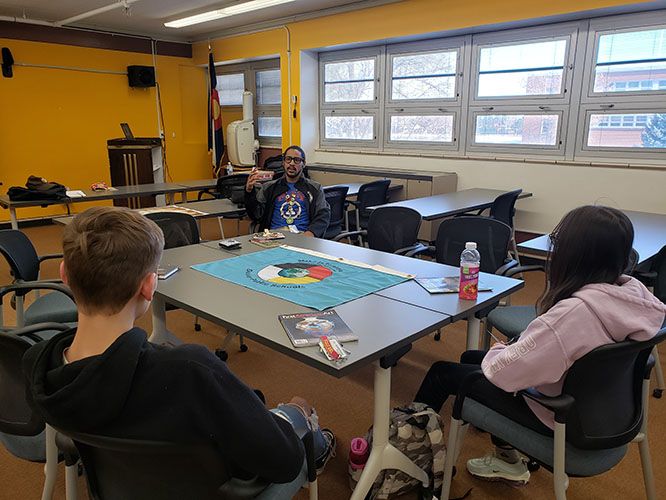
NASSP meets every week to discuss issues concerning Indigenous people on a school level to nation-wide (L to R: Aidan Byford, Marcus Cyrus, Anneliese Goetz). photo by Savignon Swimmer.
Native Communities across America unite to establish a holiday celebrating their history.
“In 1492, Columbus sailed the ocean blue,” is the rhyme taught to children, teaching them the history of how this nation was first discovered by the Italian explorer Christopher Columbus. Of course, it’s common knowledge in these times that the Americas were populated long before any European settlers came with nations of people with rich histories and cultures who existed here for centuries. However, since 1869, Columbus Day has expanded from a city-wide celebration to a national holiday in 1937. The nations of people who lived here prior to any colonization have felt forgotten and disregarded by the creation of this holiday since its founding. Now that the country is in a period of change and acceptance, native organizations are petitioning across the country to replace Columbus Day with a holiday of their own: Indigenous People’s Day.
Colorado held the first state-wide celebration of Columbus Day in 1907 as a celebration of Italian heritage. Ever since, it has taken place on the second Monday of October to celebrate Columbus’ discovery of America, supporting the history of how the Europeans brought humanity to the new world. The narrative states that Columbus and his men discovered the Americas, and they were the first people to step foot on the land. When any native people are mentioned in this telling of history, they are described as vastly inferior to the European settlers, and sometimes the natives are depicted as being the ones to commit horrible acts. “The narrative is Native Americans were less than human,” said Marcus Cyrus, one of the leaders of NASSP (Native American Student Support Program). The way it’s told, the native people would have never progressed if it weren’t for Columbus’ voyage. “One teacher in middle school…she opened with the idea that Native Americans didn’t have enough information on the climate, so they would go to the educated colonies for help,” mentioned Cyrus. Without a native perspective, the story told about the history of America is the only truth known to people. When a native child learns about this in school, knowing what they do, they come to realize their truth will always differ from everyone else’s. “It was hard trying to tell people what really happened, they’ve been taught over various years something different,” said freshman Anneliese Goetz, one of the student members of NASSP. Due to the mass genocide inflicted on the indigenous nations, their population is drastically smaller than most other races in the states. At Thomas Jefferson, there are only twelve students who identify as Native American. With such a small presence their voice can seem to go unnoticed. “We’re definitely not heard or seen as much as other people,” declared Goetz.
Three years ago, the city of Denver marked the second day of October as Indigenous People’s Day, largely due to the help from indigenous leaders such as Glen Morris and organizations such as the American Indian Movement. The first recognized Indigenous People’s Day celebration was in 1989 in South Dakota, by native leader Lynn Hart and Governor Mickelson. In 1994, Santa Cruz instituted the holiday as well. The states which celebrate Indigenous People’s Day or a variant of it as of 2019 are: Alaska, Hawaii, Louisiana, Maine, Michigan, Minnesota, Nevada, New Mexico, Oregon, South Dakota, Vermont, and Wisconsin. Dozens of cities throughout the states also celebrate it, including Denver.
In order to institute the holiday, a bill has to be introduced to the city council or state senate and then approved. When trying to institute the holiday, the same problem plaguing the native community in America shows itself, being ignored. “The challenge is being heard,” commented Cyrus. In this more accepting time society is in today, the native leaders urge anyone with indigenous ancestry to come forward and show solidarity with the movement for switching holidays, to make their presence known. The more who show up in support of the bill, the larger the chance that it will pass and Indigenous People’s Day will become a recognized holiday in more cities and states.
Given a day to really embrace their history and culture, the native nations in America are able to feel that they’re not forgotten, that they’re not disregarded, worded by Goetz as “I feel like I have a voice,” Freshman Isaiah Spencer added that “It feels good to be Native American,” However, the native community has a long way to go in terms of getting Indigenous People’s Day to be recognized at the state level in Colorado, as well in all of the other states. It’s important for native people to continue their hard work, to celebrate their culture, and to educate their peers about their history on this continent. Cyrus gave a piece of advice for natives to remember: “Any day a Native American wakes up is an Indigenous People’s Day.”